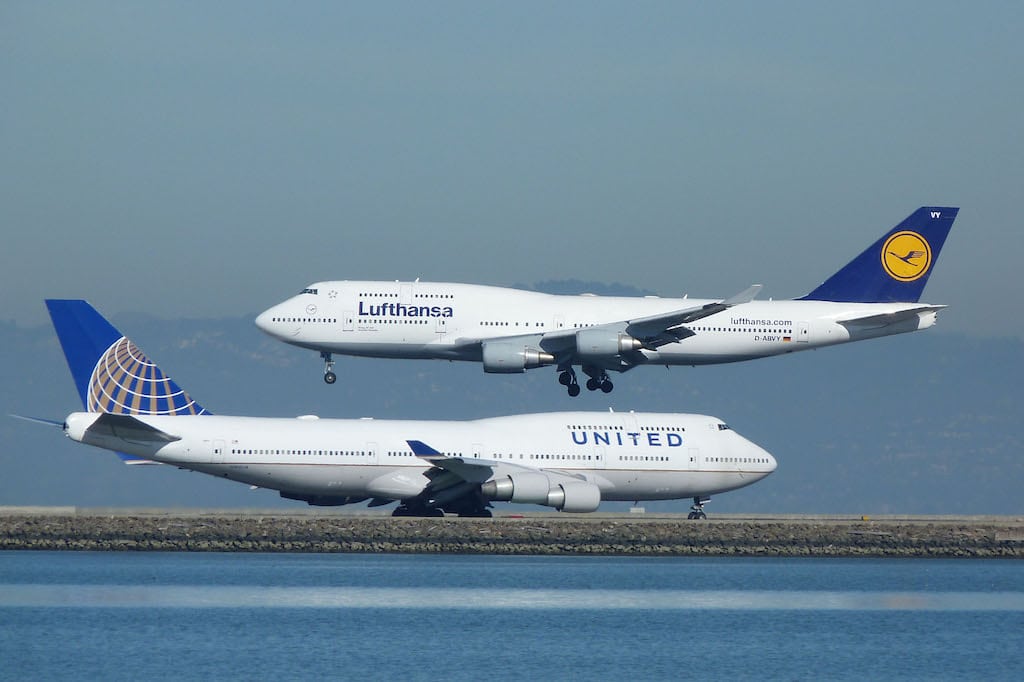Skift Take
Who's more important to the airlines: shareholders or passengers? Take one guess.
What happens when you ask three airline executives some tough questions in front of a crowd of travel professionals? Not much, apparently.
Travel Leaders Franchise Group president Roger E. Block had one-on-one time with airline execs in front of a few hundred travel agents yesterday at the ASTA Global Convention in Washington, D.C.
With the Lufthansa Group slated to impose its 16 euro surcharge beginning today, travel agents are upset that Lufthansa’s move will effectively make them less competitive than the airline group’s own sites, which don’t charge the extra fee.
United, American, and Delta executives, who are likely jittery about a U.S. Department of Justice probe into possible price collusion, didn’t have anything to offer about a response to the surcharge, or whether they would adopt a similar policy in the future.
In fact, they wouldn’t even appear together in what was supposed to be a panel discussion but instead Block interviewed them one-on-one.
“Lufthansa is a great partner of ours, but I can’t speak on behalf of Lufthansa,” said David Hilfman, senior vice president of sales for United, which has a codeshare partnership with Lufthansa. “They have obviously come to the conclusion that its in their best interest, and they’ve articulated those things publicly and in meetings with their partners and the travel agency community. They have to make the decision on what’s right for them in terms of their business objectives. The market always tells you whether you make the right business decision. That was pretty good, wasn’t it?”
Hilfman then stood up and started dancing, humming a tune, to applause from the travel agents on hand. None of the other executives were asked about the surcharge or their companies’ reaction to it.
Barring any last-minute announcements, no airline has yet disclosed that it would match Lufthansa’s move and that’s leading to conjecture that Lufthansa might eventually have to withdraw the surcharge because it would face unsustainable losses. Many travel agencies and corporations plan to book carriers other than Lufthansa where possible because of the new fee, which would be passed along to flyers.
One airline industry consultant argues that if other airlines planned on matching Lufthansa’s surcharge they would have done so already.
On the subject what exactly the airlines plan to do with their surging profits, the message was also clear: Serving customers is less important than creating value for shareholders.
“Shockingly, we’re actually supposed to be for-profit corporations,” said Hilfman. “We actually have shareholders. It’s great to see the airline industry turning into a business. While we’ve always had to focus on doing right by our customers and our best business partners… we always wanted to do better by our shareholders. Conditions in the industry weren’t always as favorable as they are today.”
The others noted that after billions of dollars in fleet and technology investments, their airlines are finally investing in service training.
“In 2012 we placed the aircraft industry’s largest aircraft order in history,” said Derek L. DeCrosse, vice president of global sales for American Airlines. “There’s another $2 billion spent converting all 747s and 757s to all lie-flat [seating]. New lounges, new aircraft facilities. Then you get into the fact that customer service training since 9/11 has all been around safety. To now turn the corner to true customer service training is a wonderful place to be in. All those dollars make our job as a sales team much easier. We have a good story to tell.”
Delta Air Lines also doubled-down on the importance of investing in people, after investing in everything else first.
“The truth of the matter is that everything can be replicated, in our estimation,” said Bob Somers, vice president of global sales for Delta Air Lines. “We all have similar airline seats, food, wine and lounges. We believe the only thing you cannot replicate is the culture of your company, your service people and the level of the service they provide. We think that’s a difference maker for Delta. It’s hard to believe in two weeks, it will have been 10 years since we declared bankruptcy, the darkest day in the history of our company.”
Block asked about the complaint filed by U.S. airlines against Gulf airlines, alleging unfair business practices. The thesis offered by United, Delta and American? Gulf governments are unfairly subsidizing their airline so the U.S. government should swoop in and make things more fair for U.S. airlines.
“We don’t mind competing with the world’s best,” said Hilfman. “In fact, we’ve gotten dramatically better. Qatar, Emirates, these are all fine airlines and products… but we’re not competing against airlines, we’re essentially competing against arms of the state. The UAE and Qatar have determined their airlines are part of national policy; the only way you do that is to help your airlines grow in anyway you can. They get $42 billion in subsidies.”
“You can’t compete against countries; you compete against companies,” said DeCrosse.
DeCrosse’s views aren’t shared by the U.S. Travel Association, many U.S.-based hotel chains and airports, which support Open Skies agreements and opposed the call for a crackdown on the Gulf carriers.
Have a confidential tip for Skift? Get in touch
Tags: american airlines, asta, delta air lines, united airlines
Photo credit: A Lufthansa aircraft lands while a United aircraft taxis in San Francisco. Bill Larkins / Wikipedia / Wikipedia

